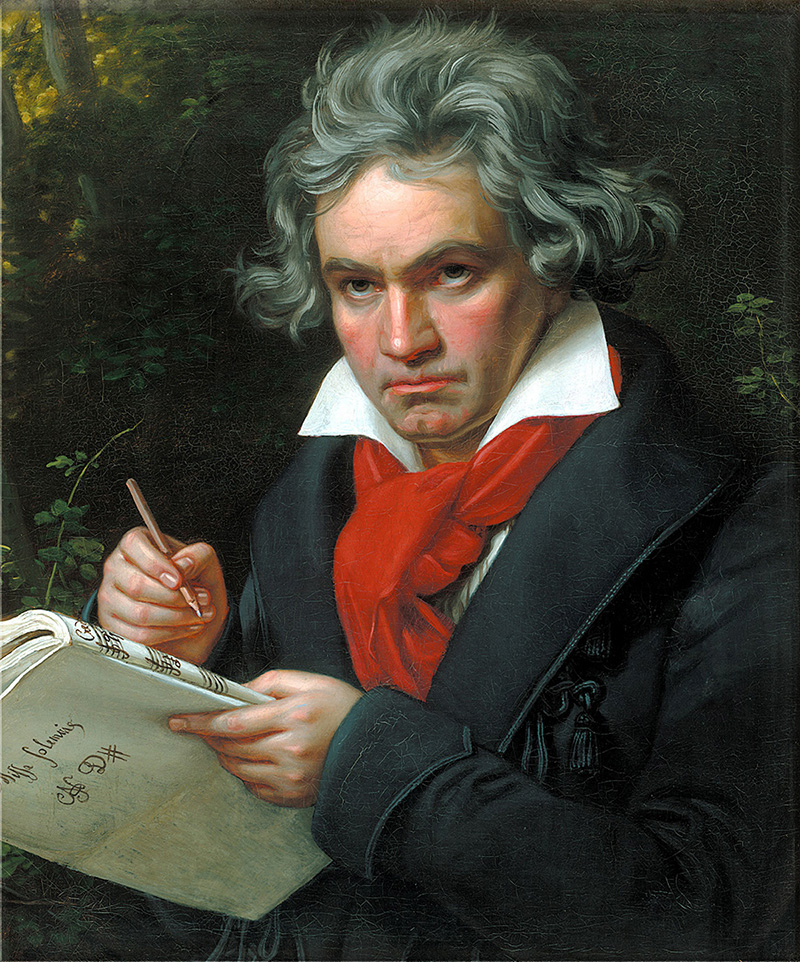Ludwig van Beethoven

- Born: baptized December 17, 1770, Bonn, Germany
- Died: March 26, 1827, Vienna
String Quintet in C Major, Op. 29, “Storm”
- Composed: started in 1800 and finished in 1801
- Premiere: unknown, published in 1802
- Duration: approx. 30 minutes
At the age of 32 and around the same time as he wrote his Second Symphony and Third Piano Concerto, Beethoven wrote his Op. 29 String Quintet—the only quintet in his oeuvre specifically composed as a multi-movement string quintet. Beethoven did, however, transcribe or rework other pieces for this combination of instruments. Op. 29 is dedicated to Count Moritz von Fries, to whom Beethoven also dedicated his Violin Sonatas Nos. 4 and 5 and his Seventh Symphony.
The autograph score was completed in 1801 and set aside for Count Fries’ use for about a year and half. Beethoven sold the publication rights to Breitkopf & Härtel in Leipzig and sent the publisher the engraver’s copy in April 1802. Unknown to the composer, the Viennese publisher Artaria had the work engraved and published in December 1802. On January 22, 1802 in the Wiener Zeitung, Beethoven publicly criticized the Artaria edition. According to court documents, Artaria came to have the parts via the manuscript copy provided to Count Fries. Nevertheless, Beethoven did edit two copies for Artaria to reissue a corrected edition by the end of 1802. A lawsuit ensued over publication rights of Op. 29 and a need for Beethoven to retract his January 1802 writing in Wiener Zeitung. The lawsuit was not resolved until a compromise was finally reached in 1805. (For more see Donald W. Macardle’s “Beethoven, Artaria, and the C Major Quintet” article in Vol. 34, Issue 4, 1948 in Musical Quarterly.)
In 1787 the young Beethoven had met the middle-aged Mozart; as fate would have it, they met during the weeks in which Mozart would have been finishing his own string quintet in C major, K. 515. Beethoven was eager to study with Mozart or Haydn, and, while on leave from the Bonn Court Orchestra, Beethoven traveled to Vienna for an audience with his idol, Mozart. The older composer agreed to the meeting, but, as the story is told, was not particularly happy about it. Beethoven started to play one of Mozart’s piano concertos and Mozart quickly cut him off, asking him to play something original. Mozart’s wife, Constanze, was in the next room and, as Constanze later reported, Mozart said, “Watch out for that boy. One day he will give the world something to talk about.” Mozart agreed to take Beethoven on as a pupil but died shortly thereafter. Beethoven’s C Major String Quintet was composed some 15 years later and Beethoven left no record of having used Mozart’s K. 515 as a model, but he was certainly familiar with this work. The florid and lyrical melody of Op. 29’s slow movement is reminiscent of Mozart’s slow movements, but Op. 29 more closely corresponds to Beethoven’s own stormy and explosive Fifth and Sixth Symphonies.
The tragedy of Beethoven’s deafness is well-known. To pinpoint the exact date and time that Beethoven realized that his hearing was failing is almost impossible. However, in June 1801 Beethoven wrote to his friend Franz Gerhard Wegeler to communicate the secret of his increasing deafness. Wegeler was trained in medicine and was uninvolved with Vienna society—a well-suited person to receive this information. Beethoven wrote:
I must confess that I am living a miserable life. For almost two years I have ceased to attend any social functions, just because I find it impossible to say to people: I am deaf. If I had any other profession it would be easier, but in my profession it is a terrible handicap. As for my enemies, of whom I have a fair number, what would they say?
Beethoven’s increasing deafness clearly caused him emotional torment; in his own words, “my poor hearing haunted my everywhere like a ghost.” As a composer, a life without the ability to hear probably seemed like no life at all. This is the internal context that most likely surrounds Op. 29. A composer coming to grips with his impending deafness, all the while putting on a front for his “enemies.” The storm (this work’s moniker) that must have been raging within Beethoven himself, perhaps found its way into the forceful, explosive and, at times, lyrical String Quintet.
—Tyler M. Secor